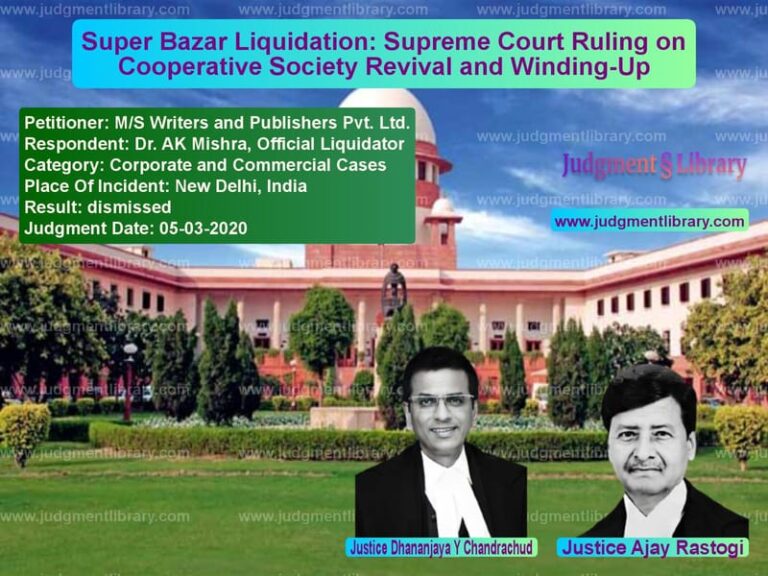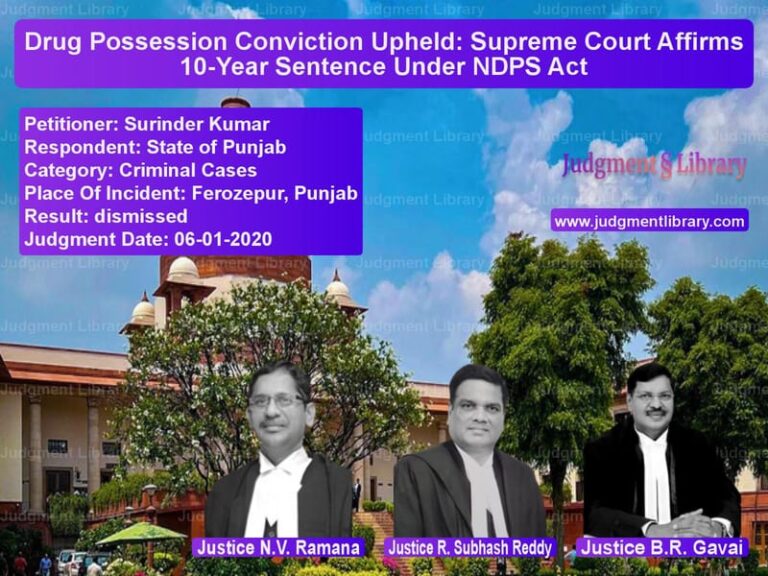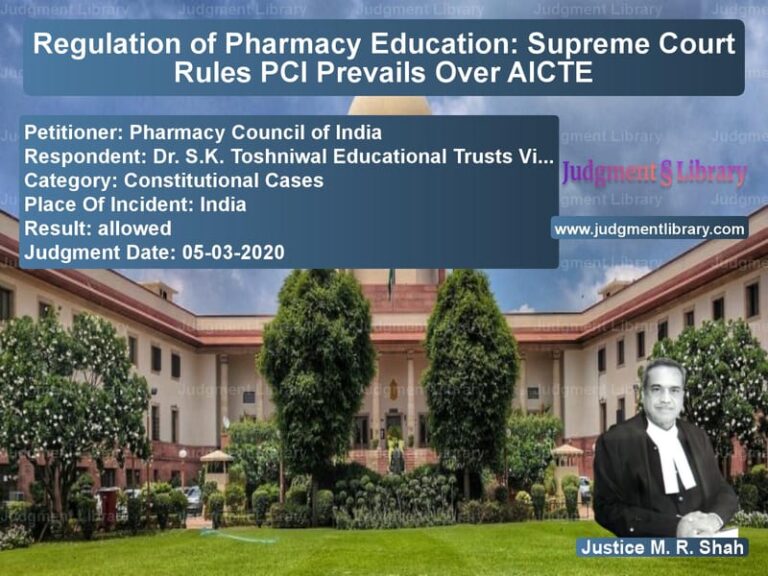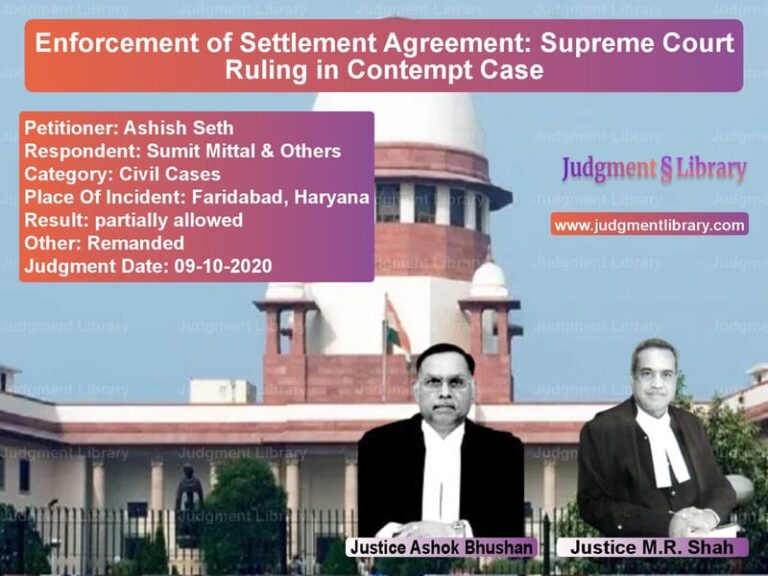Supreme Court Commutes Death Sentence to Life Imprisonment in Jharkhand Murder Case
The case of Mofil Khan & Another vs. State of Jharkhand revolves around a brutal murder that led to the conviction of the accused under Sections 302 and 449 read with Section 34 of the Indian Penal Code (IPC). The Supreme Court was tasked with reviewing the death sentence and determining whether it was appropriate given the circumstances of the case.
Background of the Case
The case originates from a violent family dispute in Makandu village, Jharkhand. On 6th June 2007, at around 8:30 PM, the petitioners, along with other accused, allegedly attacked their brother, Haneef Khan, inside a mosque while he was offering namaz. They used sharp weapons such as swords, tangis, and bhujalis to kill him on the spot.
After murdering Haneef Khan, the petitioners allegedly targeted his family. His sons, Gufran Khan and Imran Khan, were attacked outside their house and killed. The accused then stormed into the house and brutally murdered Kasuman Bibi (Haneef’s wife) and their four children:
- Yusuf Khan (18 years old and physically disabled)
- Maherban Khan (12 years old)
- Danish Khan (8 years old)
- Anish Khan (5 years old)
The motive behind the crime was a longstanding property dispute between the petitioners and the deceased Haneef Khan.
Trial and Conviction
The petitioners, along with others, were charged under Sections 302 (murder), 449 (house-trespass with intent to commit an offense), 380 (theft), and 120B (criminal conspiracy) of the IPC. The trial court convicted the petitioners and sentenced them to death.
The High Court of Jharkhand upheld the conviction and the death sentence. However, it reduced the sentence of two other accused from death to life imprisonment.
The Supreme Court, in its earlier decision on 9th October 2014, dismissed the appeal filed by the petitioners and upheld the death sentence.
Review Petition Before the Supreme Court
The petitioners filed a review petition under Article 137 of the Constitution of India, seeking reconsideration of their death sentence.
Arguments by the Petitioners (Mofil Khan & Another)
- The petitioners argued that their defense was compromised as their counsel at the appeal stage focused only on the sentencing and not on challenging the conviction.
- They claimed that the Supreme Court, in its previous judgment, relied on the theft charge under Section 380 IPC, even though they had been acquitted of that charge.
- They pointed out discrepancies in the prosecution’s case, such as the lack of forensic evidence linking them to the crime scene.
- They cited their good conduct in jail and lack of prior criminal records as grounds for reconsideration of their sentence.
- They submitted affidavits from family and community members expressing emotional support and vouching for their rehabilitation potential.
Arguments by the Respondents (State of Jharkhand)
- The State opposed the review, arguing that the conviction was based on multiple eyewitness accounts and medical evidence.
- The brutality of the murders, especially the killing of children and a disabled victim, warranted the death penalty.
- They contended that reformation and rehabilitation were unlikely given the nature of the crime.
- The prosecution cited the trial court’s observation that the crime was “cold-blooded, premeditated, and committed with extreme depravity.”
Supreme Court’s Observations
The Supreme Court bench, comprising L. Nageswara Rao, B.R. Gavai, and B.V. Nagarathna, examined whether the death penalty was justified in this case.
The Court reaffirmed that under Bachan Singh v. State of Punjab (1980), the death penalty should only be imposed in the “rarest of rare” cases when alternative punishment is unquestionably foreclosed.
The Court noted:
“The possibility of the accused being reformed and rehabilitated must be seriously considered before awarding the death sentence. This is one of the mandates of the ‘special reasons’ requirement of Section 354(3) CrPC.”
The Court highlighted several mitigating factors:
- The petitioners had no prior criminal record.
- They had spent over 14 years in jail with good conduct.
- The affidavits from family members indicated strong emotional ties, suggesting the possibility of reformation.
- The prosecution had not presented evidence proving that the petitioners were beyond rehabilitation.
The Court concluded that, while the crime was undoubtedly heinous, the alternative option of life imprisonment was not entirely foreclosed.
Final Judgment
The Supreme Court ruled that:
- The death sentence was commuted to life imprisonment.
- The petitioners would serve a minimum of 30 years in prison without remission.
- The conviction under Sections 302 and 449 IPC was upheld.
- The review petition was allowed to the extent of modifying the sentence.
Impact of the Judgment
The ruling has significant legal implications:
- Judicial Safeguards in Death Penalty Cases: The judgment reinforces that death sentences must be imposed only after thorough consideration of the possibility of reformation.
- Rehabilitation as a Key Factor: The ruling underscores the principle that even in heinous crimes, courts must consider whether the accused can be rehabilitated.
- Strict Sentencing Guidelines: The judgment aligns with previous Supreme Court rulings that mandate rigorous scrutiny before imposing the death penalty.
Conclusion
The Supreme Court’s ruling in Mofil Khan & Another vs. State of Jharkhand sets an important precedent in death penalty jurisprudence. By commuting the death sentence to life imprisonment with a minimum 30-year term, the judgment strikes a balance between ensuring justice for the victims and upholding the principle of reformation. This decision serves as a reminder that even in the most heinous crimes, courts must carefully evaluate the potential for rehabilitation before resorting to the ultimate punishment.
Petitioner Name: Mofil Khan & Another.Respondent Name: State of Jharkhand.Judgment By: Justice L. Nageswara Rao, Justice B.R. Gavai, Justice B.V. Nagarathna.Place Of Incident: Makandu village, Jharkhand.Judgment Date: 26-11-2021.
Don’t miss out on the full details! Download the complete judgment in PDF format below and gain valuable insights instantly!
Download Judgment: mofil-khan-&-another-vs-state-of-jharkhand-supreme-court-of-india-judgment-dated-26-11-2021.pdf
Directly Download Judgment: Directly download this Judgment
See all petitions in Murder Cases
See all petitions in Bail and Anticipatory Bail
See all petitions in Juvenile Justice
See all petitions in Judgment by L. Nageswara Rao
See all petitions in Judgment by B R Gavai
See all petitions in Judgment by B.V. Nagarathna
See all petitions in partially allowed
See all petitions in Modified
See all petitions in supreme court of India judgments November 2021
See all petitions in 2021 judgments
See all posts in Criminal Cases Category
See all allowed petitions in Criminal Cases Category
See all Dismissed petitions in Criminal Cases Category
See all partially allowed petitions in Criminal Cases Category







